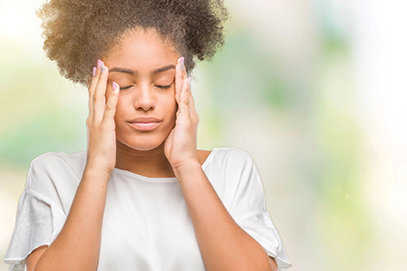What Parents Should Know About Childhood Headaches
May 31, 2024
Revised: August 13, 2024

Most headaches in children aren’t signs of a life-threatening condition. In fact, the majority of headaches are just…headaches. And kids get them a lot.
The National Headache Foundation estimates that 20 percent of school-age kids experience regular headaches that may be frequently caused by:
- Caffeine intake
- Diet
- Dehydration
- Hormone changes
- Poor sleep habits
- Stress
Still, parents and caregivers need to know what to watch for and when to seek treatment for children who complain of headache pain.
Types of Headaches
There are many types of headaches, and some are more common than others.
Primary Headaches
Primary headaches are the most common type of headaches in kids and is not caused by a medical condition or disease.
Common types of primary headaches include:
Migraines
Migraine headaches that cause intense throbbing and pain, usually on one side of the head.
Migraines affect boys and girls, though boys are more likely to get migraines before puberty. Girls experience migraines more often after puberty.
Migraine symptoms include:
- Auras (sensory disturbances)
- Dizziness
- Nausea
- Sensitivity to light
Tension headaches
Tension headaches are the most common type of headache in children. They are often triggered by depression, not enough rest, or stressful or emotional situations.
Tension headaches develop slowly. Some describe tension headache pain as a dull ache or a band around the head.
Tension headache symptoms include:
- Mild to moderate pain on both sides of the head
- Pain on the back of the head or neck
- Sleep changes
Cluster headaches
Cluster headaches are not as common as migraine or tension headaches. These headaches, which rarely occur in children under age 10, are a series of headaches lasting weeks or even months. Adolescent males are more likely to experience cluster headaches.
Cluster headache symptoms include:
- Eye irritation or redness
- Sharp pain on one side of the head, often behind the eye
- Stuffy or runny nose
- Swelling in the face or forehead
Secondary Headaches
Secondary headaches are headaches caused by another known or unknown medical condition. Conditions that cause secondary headaches in kids include:
- Allergies
- Dental problems, including TMJ (temporomandibular jaw dysfunction)
- Fever
- Head trauma, including concussion
- High blood pressure
- Infections, including sinus infections, bacterial infections and viruses
- Neurological conditions, including blood clots, brain bleeds or tumors
Treating and Preventing Common Headaches in Kids
Some kids need prescription medicine or other therapies to treat their headaches. However, you can treat many common headaches at home with over-the-counter pain relievers like acetaminophen or ibuprofen.
There are other things you can do for your child to help them manage headaches or prevent them from happening.
- Encourage rest: Poor sleep habits can trigger certain types of headaches. Ensure your child gets the right amount of sleep for their age. If your child gets a headache, encourage them to lie in a dark, quiet room.
- Keep them hydrated: Dehydration is a common cause of headaches. The American Academy of Pediatrics recommends five cups of water per day for kids ages 4 to 8 and seven to eight cups per day for older children.
- Promote healthy habits: To prevent migraines and tension headaches, find ways to help your child manage stress and encourage regular meals and healthy food choices.
When to Worry About a Headache
You know your child better than anyone else, so trust your instincts. If you’re unsure when to seek headache treatment, ask their pediatrician.
If your child is prone to headaches, watch for changes in how often they occur and how long they last. If your child begins to have more headaches, or headaches that last hours or days, it may be time to talk to their pediatrician.
You can also look for these signs of a more serious problem:
- Behavior changes: Seek medical attention if your child has a headache with behavior changes like irritability, confusion, or difficulty concentrating.
- Severe pain: Call your child's pediatrician if they complain of a headache that is so painful it keeps them from doing the things they enjoy or affects their quality of life.
- Sudden onset: Seek medical care immediately if your child has a sudden and severe headache. This may be a sign of a more serious medical condition — especially when accompanied by other symptoms like vomiting or confusion.
Learn about Joe DiMaggio Children’s Hospital's pediatric neurology services and to find a specialists who can answer your questions about your child's headache.
If your child is experiencing a severe or sudden headache, take them to an urgent care center or call 911.
